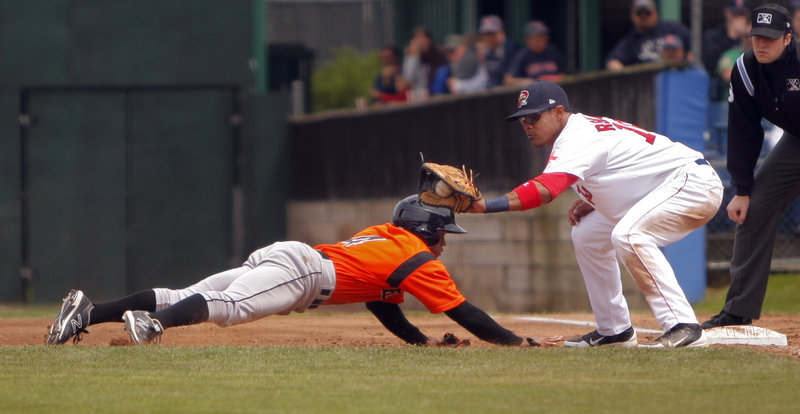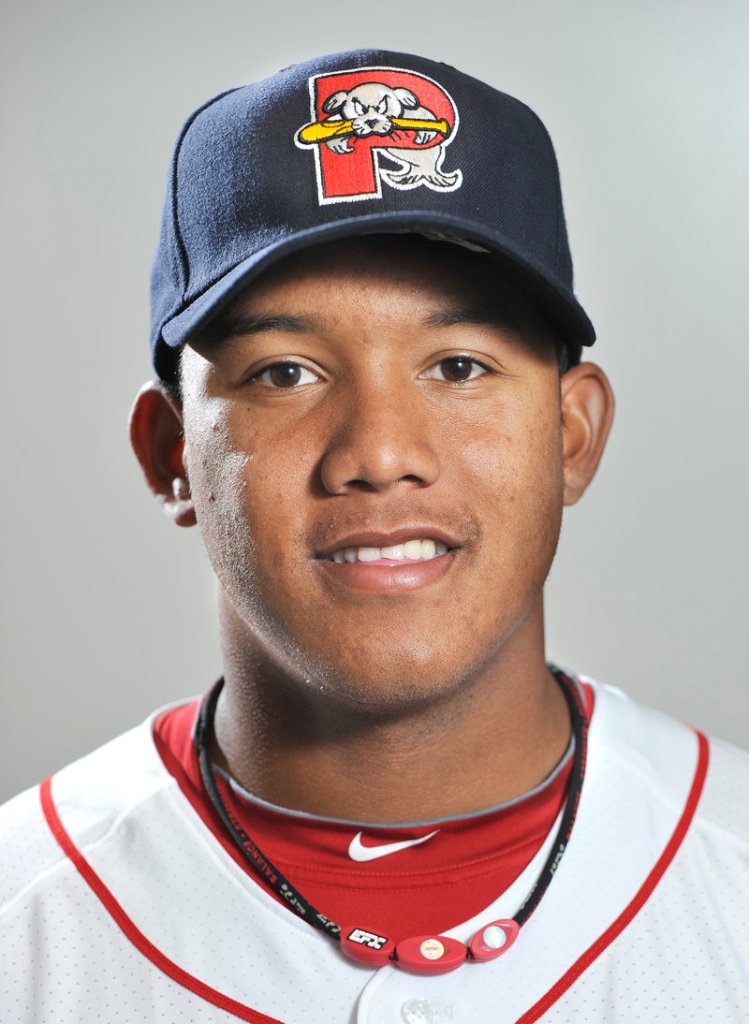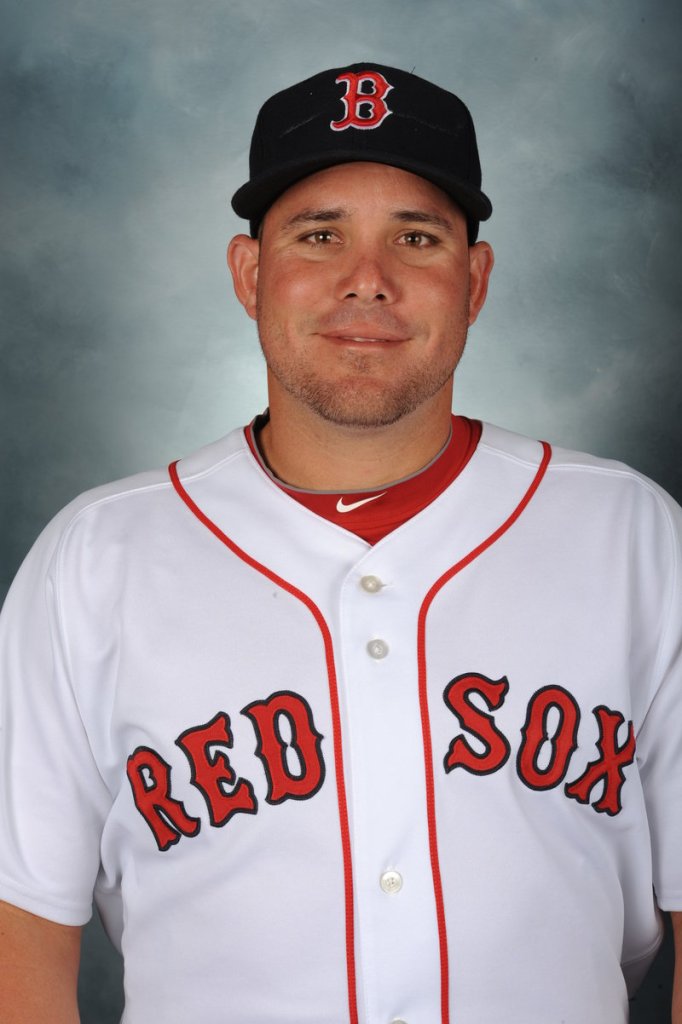PORTLAND – Their baseball talents earn them a chance to play in the United States with dreams of becoming big leaguers.
Once here, the challenges begin for Latin American players.
Along with the tasks of throwing strikes or hitting a curveball comes the adjustment to the U.S., where the language is strange, the weather sometimes cold and the food not even close to what mom dishes out.
“The food. That is tough,” said pitcher Marco Duarte. “It’s very hard to find someplace like Mexico.
“When my mom is cooking for me, I love that.”
As Duarte speaks, he takes in a deep breath, as if he’s smelling the grilled beef and spices his mother makes back in his hometown of Hermosillo.
Duarte, who recently joined the Sea Dogs, is the only Mexican on the team, joining players from the Dominican Republic (Stolmy Pimentel and Oscar Tejeda), Venezuela (Heiker Meneses), Colombia (Reynaldo Rodriguez) and Cuba (Juan Carlos Linares). Recently, Venezuelan outfielder Ronald Bermudez was promoted to Triple-A.
The Dominican Republic remains the biggest pipeline for baseball players coming to the U.S. According to statistics gathered during the 2011 season, just over 10 percent of players in the major leagues come from the Dominican. Over 7 percent come from Venezuela, and 1 percent or fewer from Cuba, Colombia and Mexico.
“Everybody wants to be like David Ortiz or Pedro Martinez,” Pimentel said of two of the more famous Dominicans to play for the Red Sox.
The Red Sox, like nearly every major league team, has a baseball academy in the Dominican. Young players are scouted and some sign. And Pimentel, like a lot of prospects, signed his first pro contract when he was 16.
“To become professional is a big deal,” he said. “Everything changes. You are getting your opportunity.”
All the Latin players identified language as the biggest challenge, but Pimentel also discovered another change last year when he came to the Sea Dogs. The rookie and lower levels of the Red Sox minor leagues are in the South. The next step is Double-A in Portland. And Maine in April can be alarming.
“When I got to Portland, it was freezing,” Pimentel said. “In my country, it never gets that cold.”
Venezuela, the only South American country where baseball is a rival to soccer, is also heavily scouted by major league teams. And teams like the Red Sox and Yankees are well known.
“When I was playing baseball in Venezuela, the Red Sox were my favorite team,” said Meneses.
Meneses, 20, signed with Boston as a 16-year-old. He spent two summers playing in the Dominican Summer League before he began playing in the U.S. in 2009.
For Cuban players, the route to American baseball is quite different. The only way is to defect from Cuba. Several defecting players, including former Sea Dogs shortstop Jose Iglesias, made their escape while traveling abroad with the Cuban national team.
But Linares made his move from Cuba, in November 2009, at the age of 25.
“It was very difficult, a little dangerous,” Linares said. When he and his wife escaped, they had to travel through swampy waters at night and then board a less-than-reliable boat for an anxious ride to Mexico.
Linares signed with the Red Sox the following July and was in Portland that August. Linares began the 2011 season in Triple-A Pawtucket but injured his leg on a slide and played only 13 games.
Linares, 27, surprisingly began this season back in Portland. But he is not complaining, maybe because of an appreciation from where he came from.
“I’ve always said, and I’ll always say, that I’m willing to play wherever they send me,” Linares said through an interpreter.
Linares does communicate in English – with his coaches. After a session in the batting practice cage, hitting coach Dave Joppie pulled Linares aside for a conversation, animated by Joppie demonstrating a batting stance and swing.
“They understand when we’re talking hitting,” Joppie said. “Baseball is a universal language.”
And the language of Red Sox baseball is taught early at the team’s Dominican academy.
“Our staff down there runs drills and uses the same terminology as our domestic staff, and the same as the players will experience in spring training,” said Duncan Webb, the Red Sox player development programs coordinator.
“This requires that the players have a working knowledge of baseball terms in English, so we have them attend class five days a week in the afternoon, following their day on the field.”
The English classes continue when the players come to the U.S., as well as orientations about American life.
“A big part of my job is making sure they understand the differences – good and bad – of living in the United States as compared to their home countries,” Webb said.
And one of those adjustments is the food. In past years, the Latin American players flocked to the nearby La Bodega restaurant, which featured Dominican cuisine. But it is temporarily closed.
“We go to Chipotle,” Tejeda said. “It’s good, but not the same.”
Rodriguez remembers those runs to La Bodega, but he has a backup plan.
“My mother taught me to cook,” he said.
Rodriguez, 26, arrived in the U.S. in the Yankees’ organization, where he played from 2004-07.
“When I came here, it was hard,” he said. “You can’t speak English so you can’t talk to anybody.”
But Rodriguez’s English is fine now, as is his batting, with a team-leading 11 home runs.
In the offseason, Rodriguez will head back to Colombia, where he will play in the winter leagues. Others will do the same in their own countries (Linares now resides in Mexico).
Then they will return in February to spring training in Fort Myers, Fla. They will miss the home cooking, while they improve their English.
And they will play a little baseball.
“The goal is not only to come to the U.S.,” Meneses said. “But to play in the big leagues.”
Staff Writer Kevin Thomas can be contacted at 791-6411 or at:
kthomas@pressherald.com
Twitter: ClearTheBases
Copy the Story Link
Send questions/comments to the editors.






Success. Please wait for the page to reload. If the page does not reload within 5 seconds, please refresh the page.
Enter your email and password to access comments.
Hi, to comment on stories you must . This profile is in addition to your subscription and website login.
Already have a commenting profile? .
Invalid username/password.
Please check your email to confirm and complete your registration.
Only subscribers are eligible to post comments. Please subscribe or login first for digital access. Here’s why.
Use the form below to reset your password. When you've submitted your account email, we will send an email with a reset code.